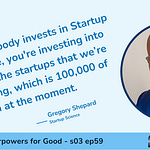Devin: What is your superpower?
Jenny: I think one of my biggest superpowers is seeing the potential that exists in people, just seeing the gifts they have to share with the world and helping them see it, too.
Jenny Kassan, President of The Kassan Group, has devoted her impressive career to helping people accomplish more for the greater good of their communities and humanity. She is a partner in Crowdfund Mainstreet and Opportunity Mainstreet and helps lead Angels of Mainstreet. She’ll also be speaking at SuperCrowd22 in September.
Explaining her work at The Kassan Group, Jenny says, “What we’ve grown into is a full-service law firm/consulting/coaching firm that supports entrepreneurs in their efforts to raise money for their business in a way that allows them to stay true to their mission, goals and values.”
“Our clients are very diverse in terms of what they can realistically offer to investors, what it is about what they’re doing that’s going to be attractive to investors and what type of investors will be attracted to what they’re offering,” she says. “So we try to throw everything into the mix and have a lot of community support as well.”
“We even have opportunities for them to present to potential investors,” Jenny adds.
“Over the years, I’ve learned how many different pieces to the puzzle need to be in place for someone to successfully raise money,” she says. “it’s beautiful to watch our clients successfully raise money everywhere from a few hundred thousand to a few million and do it on their own terms.”
Jenny doesn’t work with everyone who virtually walks through the front door. “Our main criteria when we’re deciding if it’s a good fit for us to work with someone is whether they are very passionately mission-driven in what they’re doing in their business.”
Founding Story of Crowdfund Mainstreet
Jenny was a critical part of creating Crowdfund Mainstreet but admits, “I never would have wanted to do that myself.”
The roots of Crowdfund Mainstreet, founded in 2017, go back to 2010. At the time, Jenny was working with Janelle Orsi at a nonprofit called Sustainable Economies Law Center.
“One of the first things I did out of that nonprofit was to write a petition to the Securities and Exchange Commission to ask for a change in the law to make it easier for regular folks to invest in businesses that they love and care about,” Jenny says.
Two years later, the JOBS Act passed both houses of Congress with bipartisan support and was signed into law by President Obama. The Securities and Exchange Commission, charged with implementing the new law giving ordinary investors the right to invest in private companies, acted methodically, launching Regulation Crowdfunding in 2016.
Jenny was disappointed by the market’s reaction to crowdfunding. “I wasn’t seeing any of the platforms that started to come out be aligned with the whole reason I did that in the first place, which was to support Main Street style businesses.”
About that time, she encountered Michelle Thimesch, another lawyer who sees the world through the same prism. Michelle wanted to launch a FINRA-regulated crowdfunding site focused on serving the market they’d both hoped would flourish under the new rules.
Jenny became counsel to Crowdfund Mainstreet. “We hit it off so well that she invited me to be a co-founder.”
Today, Crowdfund Mainstreet supports social entrepreneurs, especially women and BIPOC founders, to raise the money they need to succeed.
The Story of Opportunity Mainstreet
Jenny and Michelle never seem to be satisfied. Progress doesn’t seem to be fast enough for them. They’ve launched Opportunity Mainstreet to serve as another sort of catalyst for building a community around underserved entrepreneurs.
They saw that while women and minorities are raising more money via crowdfunding as a percentage of the marketplace compared to venture capital, angel investments and traditional banking, they still don’t do as well as white men. They’re building Opportunity Mainstreet to fix that.
“We decided to do it in Baltimore because the real estate prices were reasonable. And we love Baltimore,” Jenny says. “It’s like it’s such an amazing city. It’s a very entrepreneurial city.”
She described their vision. “We were able to buy this gorgeous, historic building downtown. It has a beautiful space on the ground floor where we can host all kinds of events, have a commercial kitchen, have a retail space, a cafe.”
They are creating a place where entrepreneurs, customers and investors can gather routinely to build relationships of trust that will facilitate growth and prosperity in the community.
Opportunity Mainstreet also helps Jenny with her law practice.
This is my fifth time raising money from investors. Part of the reason I love to raise money from investors is so that I learn all the things that happen when you're raising money, because it helps it lets me help my clients better. I can really be in their shoes.
Having already acquired the building, Jenny and Michelle continue working to raise capital for the business to make the needed upgrades to realize their vision. “We found some people would rather invest in a debt instrument. Some people would rather get equity,” she says.
A bit ironically, Jenny and Michelle are raising the money for Opportunity Mainstreet from accredited, that is, wealthy, investors only.
“The debt pays a 7 percent interest rate; the equity has a projected return of 13 percent,” Jenny says. We’re finding people are more drawn to one than the other. Some people are doing half and half.”
Notably, she says that the people who are investing in Opportunity Mainstreet are not folks who self-identify as investors. “They’re not professional investors, but they love the opportunity to invest in something like this.”
“According to my calculations, 99.7 percent of the investors in our country are not professional investors,” Jenny says. “They’re just regular folks who maybe have never before invested outside of Wall Street. Those are the people we go to. We’ve already raised several hundred thousand dollars that way.”
“We do have a six-step process that we go through to design a fundraising strategy, which I wrote about in my book Raise Capital on Your Own Terms,” she says. “basically, it’s all about figuring out what to offer. What is it that’s going to be a good offering for your goals and values but also will be attractive to your ideal investors?”
“If you just stay persistent and keep reaching out, keep telling people about it, eventually you will start to find people who are interested,” she adds.
Speaking at SuperCrowd22
Jenny will be speaking at SuperCrowd22. She delivers her keynote on Thursday, September 15 at 5:00 PM Eastern/2:00 PM Pacific. She titled her speech, “What women and non-binary folks need to know about investment crowdfunding.”
“I’m just so thrilled that you’re putting the effort in to create a big gathering for everyone to get together and talk about where we are, what the potential is and how to include more people in the success,” she said about the conference.
Remember, Superpowers for Good readers can register for the conference at half price. Click here for details.
In all her work, Jenny relies on her superpower, an ability to see people’s potential and help them see it too.
How to Develop Seeing Potential As a Superpower
Early in her career, Jenny felt this superpower as a beneficiary of other people wielding it on her behalf. “It happened to me when I was very young and very insecure and didn’t believe that I had the ability to do that many things,” she says. “I had a boss, and it ended up I had three different bosses in a row that all, thank goodness, saw potential in me and helped me see it in myself.”
Today, this skill shapes her practice. “When I meet an entrepreneur, I so often just see the vision of what they could do if they only had the resources they needed to make it happen,” she says.
“I don’t necessarily believe they need some accelerator program or some quote-unquote smart investor on their board,” Jenny says. “They know what they need to do. They know how to build the thing that they’re dreaming of doing. They just need the money to make it happen.”
Jenny offers two tips for developing this superpower.
Find examples. Look for people who start from a small place and have, with support from a community, gone on to do amazing things.
Find someone who sees your potential. Look through your experience for people who saw your potential before you did. Emulate them with respect to others you meet.
By following Jenny’s example and advice, you can make seeing potential a superpower to do more good in the world.
















